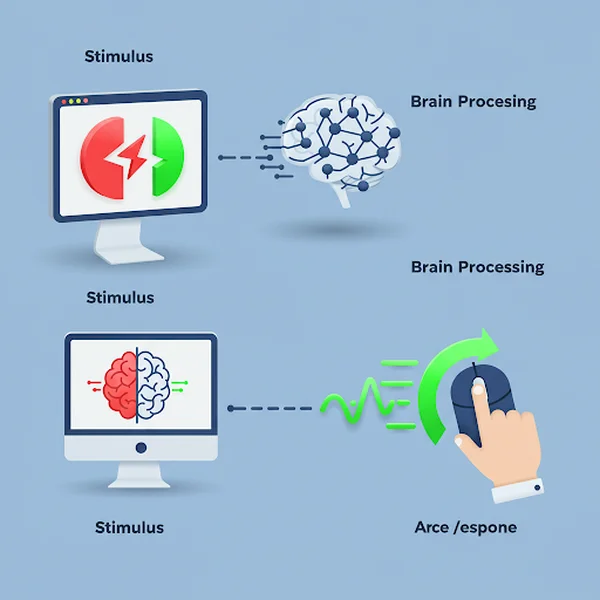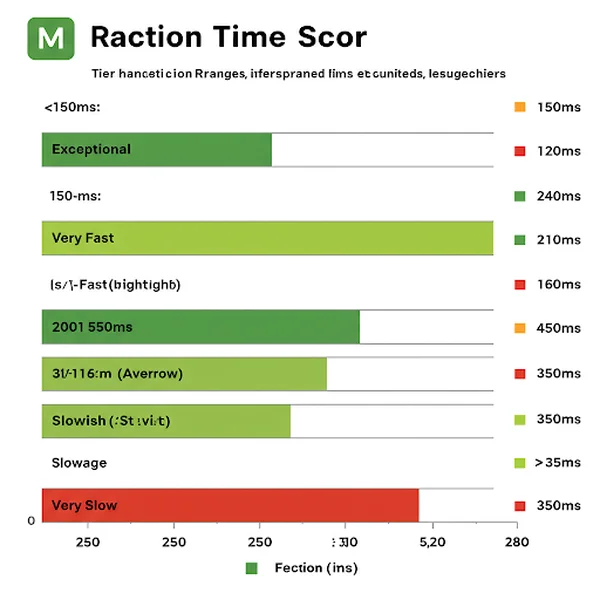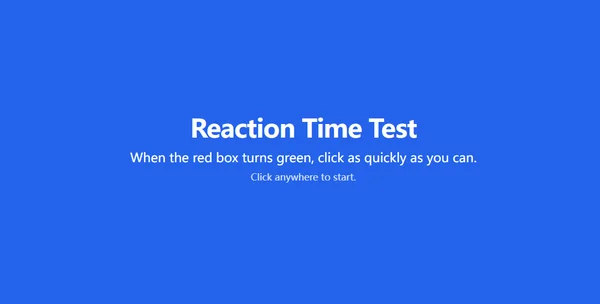Is 200ms Reaction Time Good? Fast vs. Slow Score Guide
May 10, 2025 | By Marcus Adler
So, you've taken a reaction time test and now you're staring at your score, perhaps a crisp 200ms, and wondering: Is 200ms reaction time good? This is a common question, and understanding what constitutes a good reaction time is key to interpreting your performance. This guide will help you decode your reaction time ms score, whether it's lightning fast or has room for improvement. Ready to dive in and see how your reflexes stack up? You can always test your reaction time again on our site to get your latest score!
Understanding Reaction Time Benchmarks: More Than Just a Number
Before we jump into specific numbers like 200ms or 300ms, it's important to understand what a reaction time benchmark truly represents. It's not just a static figure; it's a measure of your cognitive ability to perceive, process, and respond to a stimulus – in the case of many online tests, like the one on ReactionTimeTest.net, this involves reacting to a visual cue, such as a color change from red to green.

What is Considered Average Human Reaction Time?
What is the average human reaction time? Generally, for a simple visual stimulus, the average human reaction time hovers around 250 milliseconds (ms). However, this can vary widely. Some studies suggest the typical range for visual reaction speed is between 200ms and 300ms for most adults. It's a useful starting point for comparison.
Factors That Can Influence Your Reaction Time Score
It's also crucial to remember that several factors can influence your milliseconds score on any given day. These include:
- Age: Reaction time tends to be quickest in young adulthood and may gradually slow with age.
- Alertness Level: Fatigue, drowsiness, or even distractions can significantly increase your reaction time.
- Practice: Like many skills, you can often improve your reaction time with consistent practice.
- Device and Connection: The type of device, screen refresh rate, and internet stability can sometimes play a minor role. Understanding these variables helps in not getting too fixated on a single reaction test result.
Is a 200ms Reaction Time Good? Analyzing a Common Benchmark
Now, let's address the core question: Is a 200ms reaction time good? In short, yes, a score around 200ms is generally considered a very good reaction time. Many consider it to be an excellent reaction time ms, indicating quick reflexes and efficient processing.
Why 200ms is Often Seen as a Target for Good Reaction Speed
Why is 200ms often highlighted? For many activities, especially in gaming reflexes or competitive sports, reacting within this timeframe can provide a significant advantage. It’s faster than the general average and demonstrates a high alertness level. Achieving a consistent 200ms reaction time is a commendable feat. If you're curious about your own performance, why not check your reaction time now?
Comparing Your 200ms Score to Average and Elite Levels
If your human benchmark score is around 200ms, you're performing better than a large portion of the population. While elite athletes or professional gamers might consistently score even lower (sometimes sub-150ms), 200ms places you in a very competent bracket. It's a fast reaction time by most standards.
What About a 300ms Reaction Time? Is It Considered Slow?
What if your score is closer to 300ms? Is 300 ms a good reaction time, or is it slow? A 300ms reaction time is generally considered to be within the average range for many individuals, particularly if you're not specifically training for speed. It's not necessarily "slow" in a detrimental way for everyday tasks, but it indicates there's potential for improvement if speed is your goal.
Contextualizing a 300ms Reaction Time Score: When It Might Be Okay
For casual users or those not engaged in activities demanding split-second responses, a 300ms reaction time is perfectly adequate. It’s important to consider the context. Not everyone needs the reaction speed of a fighter pilot.
When a 300ms+ Score Indicates Room for Reaction Speed Improvement
However, if you're aiming for better performance in gaming, sports, or simply want to sharpen your cognitive ability, a score consistently above 300ms might be an indicator that some reaction time training could be beneficial. This is where a reliable reaction time tester like ours can be invaluable for tracking progress.
Defining "Fast" Reaction Time: What Scores Are Truly Impressive?
So, what defines a truly fast reaction time? While "fast" is somewhat subjective, scores that consistently dip below the 200ms mark start to enter impressive territory. These are often seen in individuals with highly trained reflexes.
Scores Below 180ms: Entering the Elite Reaction Time Zone
Achieving a reaction time ms score below 180ms is exceptional and often places you in the elite zone. This level of reaction speed is common among professional athletes and top-tier esports players who rely heavily on their reflex test abilities.
Is a 100ms Human Reaction Time Possible? Debunking Myths
A common question is: Is 100ms reaction time possible? For a simple visual reaction time test involving a conscious response, consistently achieving 100ms is generally considered to be at or beyond the limit of human physiological capabilities. While some pre-emptive or highly anticipated responses might appear close, true reaction to an unexpected stimulus below ~120-150ms is extremely rare and often debated. It's important to have realistic performance tiers in mind.
Good, Average, and Slow Reaction Time (ms) Chart
To give you a clearer picture, here’s a general guideline for interpreting your visual reaction time ms scores. Remember, these are approximate performance tiers:

Visual Reaction Time Chart: Performance Tiers
- < 150ms: Exceptional / Elite (Potentially world-class human benchmark)
- 150ms - 200ms: Very Fast / Excellent (fast reaction time)
- 201ms - 250ms: Good / Above Average (Solid good reaction time)
- 251ms - 300ms: Average (Typical human reaction time)
- 301ms - 350ms: Below Average / Slowish (slow reaction time potential)
- > 350ms: Very Slow / Significant Room for Improvement
You can always perform a benchmark test online to see where you fall.
Beyond the Number: Why Consistent Reaction Time Matters
It’s also important to consider consistency. A single fastest reaction time is great, but having consistently good scores across multiple attempts often provides a more accurate picture of your typical reaction speed. Fluctuations are normal, but a narrow range is a good sign.
How Our Reaction Time Test Helps You Benchmark Your Speed
Our reaction time test at ReactionTimeTest.net is designed to give you a simple, accessible way to measure and benchmark your visual reaction speed. By reacting to the color change, you get an instant milliseconds score.

Taking Our Online Reaction Test: Tips for Accurate Results
To get the most accurate results from our online reaction test:
- Ensure you're alert and focused.
- Minimize distractions in your environment.
- Use a stable internet connection and a responsive device.
- Take the test multiple times to get an average. This helps understand your typical reaction time.
Tracking Your Reaction Time Progress Over Time with Our Tool
One of the best ways to see improvement is to track your progress. By using our reaction time tester regularly, you can monitor how your scores change, especially if you're actively trying to improve your cognitive ability or gaming reflexes.
Your Reaction Time Score: A Starting Point for Improvement
Ultimately, your reaction time score – whether it's a 200ms reaction time, a 300ms reaction time, or something else – is a snapshot of your current ability. It's not set in stone. For many, it serves as a fantastic starting point for understanding and even enhancing their reaction speed. Knowing what a good reaction time is gives you context and motivation.
So, what was your score? Are you happy with it, or are you inspired to improve? We encourage you to use our reaction time test regularly, experiment with ways to boost your focus, and see how your reflexes evolve.
Frequently Asked Questions About Reaction Time Scores
Here are answers to some common questions we receive:
Is a 160 ms reaction time considered fast?
Yes, a 160 ms reaction time is definitely considered fast. It falls into the "Very Fast / Excellent" category and is significantly quicker than the average human reaction time. Achieving this consistently shows very sharp reflexes. Curious how you measure up? Try our click test now!
Is 350 ms reaction time typically slow?
A 350 ms reaction time is generally considered to be on the slower side of average, or "Below Average / Slowish." While not alarmingly slow for everyday life, if you're aiming for quicker responses in specific tasks like gaming, this score indicates a good opportunity for improvement. You can always test your reaction speed to see if you can better this.
Can my reaction time score vary significantly from day to day?
Absolutely. Your reaction time score can vary based on your alertness level, fatigue, stress, caffeine intake, and even your mood. That's why taking multiple readings over time, or using a tool like our reaction timer, provides a more reliable reaction time benchmark than a single test.
How does age affect what is a good reaction time?
Age is a known factor. Generally, reaction time is quickest in early to mid-adulthood (20s-30s) and may gradually increase (slow down) with age. So, what's considered a good reaction time for a 20-year-old might be different for a 60-year-old. However, many older adults maintain excellent reaction times, especially with an active lifestyle and cognitive engagement.
Is a single fast reaction time score or consistent scores more important?
While a single fastest reaction time can be exciting, consistent scores are often a better indicator of your reliable reaction speed. Consistency suggests that your ability to react quickly is stable and not just a one-off lucky click. Our human benchmark test on ReactionTimeTest.net allows you to take multiple trials.
We hope this guide helps you better understand your reaction time scores!